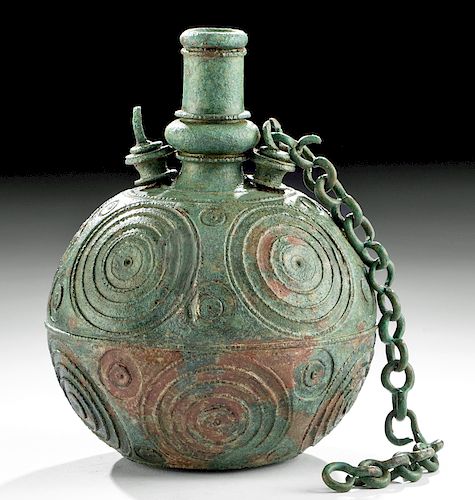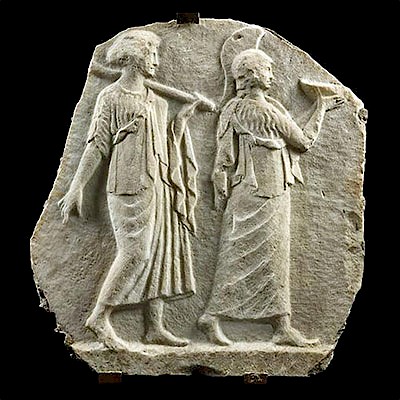Roman Bronze Balsamarium w/ Concentric Circles
Lot 50
About Seller
Artemis Gallery
686 S Taylor Ave, Ste 106
Louisville, CO 80027
United States
Selling antiquities, ancient and ethnographic art online since 1993, Artemis Gallery specializes in Classical Antiquities (Egyptian, Greek, Roman, Near Eastern), Asian, Pre-Columbian, African / Tribal / Oceanographic art. Our extensive inventory includes pottery, stone, metal, wood, glass and textil...Read more
Categories
Estimate:
$4,000 - $6,000
Absentee vs Live bid
Two ways to bid:
- Leave a max absentee bid and the platform will bid on your behalf up to your maximum bid during the live auction.
- Bid live during the auction and your bids will be submitted real-time to the auctioneer.
Bid Increments
| Price | Bid Increment |
|---|---|
| $0 | $25 |
| $300 | $50 |
| $1,000 | $100 |
| $2,000 | $250 |
| $5,000 | $500 |
| $10,000 | $1,000 |
| $20,000 | $2,500 |
| $50,000 | $5,000 |
| $100,000 | $10,000 |
| $200,000 | $20,000 |
About Auction
By Artemis Gallery
Feb 13, 2020
Set Reminder
2020-02-13 10:00:00
2020-02-13 10:00:00
America/New_York
Bidsquare
Bidsquare : Exceptional Antiquities, Asian, Ethnographic
https://www.bidsquare.com/auctions/artemis-gallery/exceptional-antiquities-asian-ethnographic-4848
An important one-day auction featuring museum-worthy examples of Egyptian, Greek, Roman, Etruscan, Near Eastern, Far East / Asian, Pre-Columbian, African / Tribal, Oceanic, Native American, Spanish Colonial, Russian, Fossils, Ancient Jewelry, Fine Art, so much more! Artemis Gallery info@artemisgallery.com
An important one-day auction featuring museum-worthy examples of Egyptian, Greek, Roman, Etruscan, Near Eastern, Far East / Asian, Pre-Columbian, African / Tribal, Oceanic, Native American, Spanish Colonial, Russian, Fossils, Ancient Jewelry, Fine Art, so much more! Artemis Gallery info@artemisgallery.com
- Lot Description
Roman, Imperial Period, ca. 1st to 3rd century CE. An ornate, heavy, cast bronze balsamarium, a rounded vessel with relief concentric circles in two registers around its body and a tall, narrow spout. A cast bronze chain is attached with sturdy decorative loops on either side of the spout, one of which remains in excellent condition, as does the chain itself. Roman bronze smiths commonly employed the concentric circle motif as a ward against the "evil eye". Size: 3.5" W x 4.9" H (8.9 cm x 12.4 cm)
Balsamaria were, as the name suggests, used for holding balsam, the resinous, sap-like product of many different plants, as well as the oil used by athletes to clean their skin. Balsamaria most often depict women's or satyr's heads, but some are more abstract, like this example. Cosmetics were as important to the ancient Romans as they are to us today, used by men and women, and with specialized equipment made for holding them. Often balsamaria were so important that they were buried with their owners and some, like one of a woman's head at the British Museum (1868,0601.3) were made exclusively to be placed into tombs with offerings rather than used by the living.
Provenance: private East Coast, USA collection; ex-Royal-Athena Gallery, New York, USA, acquired in December 2013 at Gorny & Mosch, Munich, Germany; ex-private German collection
All items legal to buy/sell under U.S. Statute covering cultural patrimony Code 2600, CHAPTER 14, and are guaranteed to be as described or your money back.
A Certificate of Authenticity will accompany all winning bids.
We ship worldwide and handle all shipping in-house for your convenience.
#152844Tiny area of repair/restoration on upper shoulder that is well-done and difficult to see. Small deformation of form low on one side and on the foot, but it stands easily on its own. One of the loops for securing the chain is partially lost and one of the chain's loops is open.Condition
- Shipping Info
-
All shipping is handled in-house for your convenience. Your invoice from Artemis Gallery will include shipping calculation instructions. If in doubt, please inquire BEFORE bidding for estimated shipping costs for individual items.
-
- Buyer's Premium



 EUR
EUR CAD
CAD AUD
AUD GBP
GBP MXN
MXN HKD
HKD CNY
CNY MYR
MYR SEK
SEK SGD
SGD CHF
CHF THB
THB
















